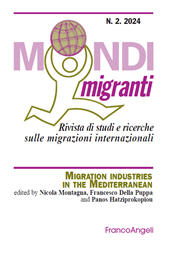La Moschea Digitale, raccontare Allah nei tempi del Covid : il caso delle comunità musulmane in Italia
193-213 p.
Attingendo a due casi etnografici, in mare e a terra, che hanno riguardato diversi Paesi (Tunisia e Italia), e che mettono insieme i risultati di diverse ricerche etnografiche condotte su diversi campi, questo articolo esplora il nesso tra solidarietà e migration industry "dal basso". In questo quadro, secondo gli autori la solidarietà non prende forma in un frame morale/idealistico; piuttosto, viene affrontata con un approccio materialistico, rivelando le sue forme molteplici e spurie, nonché la sua importanza per il completamento di una molteplicità di transazioni e scambi attraverso i quali i migranti danno forma alle loro routine quotidiane. L'articolo si compone di due casi di studio etnografici in cui tutti gli autori sono stati coinvolti, anche se in modi diversi.
Approfondendo le specificità dei diversi campi etnografici, gli autori giungono a definire la "solidarietà interessata" come un insieme di pratiche materiali che possono essere configurate sia come costitutive di un legame sociale sia come un insieme di pratiche capacitative, che consentono alle persone di esercitare concretamente i propri diritti, anche in contesti ostili o attraversati da violente dinamiche di razzializzazione. [Testo dell'editore].
Drawing on two ethnographic cases, at sea and on land, which concerned different countries (Tunisia and Italy) and bring together the results of different ethnographic research conducted on different fields, this article explores the nexus between solidarity and the migration industry "from below". In this framework, according to the authors, solidarity does not take shape in a moral/idealistic frame; rather, it is conceived within a materialistic approach, revealing its multiple and spurious forms, as well as its importance for the completion of a multiplicity of transactions and exchanges through which migrants shape their daily routines. The article consists of two ethnographic case studies in which all authors were involved, albeit in different ways.
By delving into the specificities of the different ethnographic fields, the authors come to define "interested solidarity" as a set of material practices that can be configured both as constitutive of a social bond and as a set of capacitive practices, which allow people to concretely exercise their rights, even in hostile contexts or crossed by violent racialisation dynamics. [Publisher's Text].
Is part of
Mondi migranti : 2, 2024-
Articles from the same issue (available individually)
-
Information
ISSN: 1972-4896
KEYWORDS
- solidarietà, pratiche sociali, industria della migrazione, confine, agricoltura
- solidarities, social practices, migration industry, border, agricul-ture


